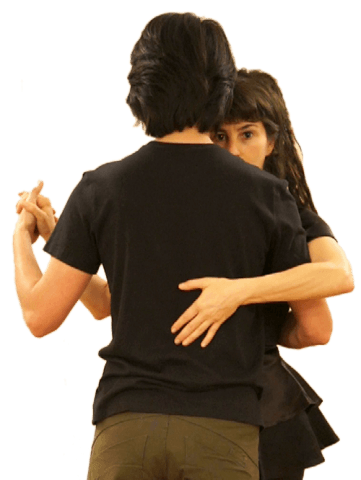I don’t watch tango championships on YouTube. I listen to interviews with Bankers – and Silicon Valley Founders, and any kind of daring entrepreneur.
Because I’m lonely.
It’s hard being avant-garde, but apparently, according Richard Branson, you’re supposed to keep at it. He’s making a podcast to encourage visionary entrepreneurs.
So I was listening to this interview with Josh Reich, founder of a bank called Simple.
I was haunted; there was something there for me. I listened to it again.
Banks make money from keeping their customers confused….They are profiting from customers being ineffective at using the product.
Right. Tango teachers make money from our students failing to learn. If we could teach students what they need to know in a year – or 6 months, then they wouldn’t need us anymore.
And we know how hard it is to get new students.
So we sell ever-deepening layers of mystery.
An industry of secrets
Don’t tell too much!
A friend has reported to me that when starting to teach in BsAs, elders admonished him not to share too much of his knowledge.
I know that at DNI they weren’t drinking the same Koolaid they were selling. I watched them train a whole series of their pretty secretaries to dance beautifully in about 6 months. But after filling my notebooks with notes for years in private lessons there, my dance was verifiably uglier than when I arrived. (To be fair, I think they are straightforward and effective in how they teach Marks.)
What distinguished Dana and DNI when I started studying there was that they talked about follower’s technique, 50% of the time! Until finding Dana, I felt lucky if I got a single fragment of follower’s advice from an expensive workshop with the famosos who alighted in Los Angeles. But that doesn’t mean that her business strategy was ultimately any different from the tight-lipped teachers. She just assembled the appearance of a higher flow rate.
This is fraud, and it is a criminal offense in Commonwealth law.
The requisite elements of perhaps most general form of criminal fraud, theft by false pretense, are the intentional deception of a victim by false representation or pretense with the intent of persuading the victim to part with property and with the victim parting with property in reliance on the representation or pretense and with the perpetrator intending to keep the property from the victim.[Wikipedia]
Or, in other words, it is intentional misrepresentation, so as to gain compensation without delivering the goods.
Naïve incompetence
One day a Porteño friend sat next to me in a milonga and explained to me how it works.
“Who are the guys who are dancing every night until 0400 until they become amazing dancers? Those are guys with no education, no profession, and from families who don’t put pressure on them to make a career. They have only basic education, they don’t have a lot of skills for observersation, analysis, articulation. They are dancing as a hobby, or because they are sad, or it makes them feel good in some way. Then they meet some foreign girl in a milonga and she thinks wow what a great dancer and she invites them to teach in a foreign land. Now we have a world class dancer, surrounded with expectant students and admirers. Does he know how to teach? Can he articulate what is body is doing? Does he have any relevant training for this? Often not.”
And what happens when you “fake it till you make it?” You start to believe your own bullshit, fast. You have to. And how can you eat humble pie and go get the education you need? Nope, just keep elaborating the bullshit.
Sweat equity
These guys, and me, and every tango teacher I know, and all the ones I don’t, have one very important thing in common.
We taught ourselves to teach. And we are proud of what we think we have figured out about that.
And given that there’s precious little glory to be had, and just a fairy’s dusting of glamour, and even less money, our pride in our work as teachers is the psychic payoff for the years and courage we’ve invested in this fleetingly ecstatic and equally painful art.
We think we’re right. And the thing of least possible interest to us is anyone else’s method. If there are no results, we blame the students.
And this comes about in fact for very reasonable and innocent reasons:
- Everyone is entitled to take pride in their hard work. There’s nothing wrong with that.
2. It’s just that the teaching that’s going on –even when it’s reasonably good– is amateur by any standards (there is no professional education, certification, or elevation process) and is then warped by the financial exigencies of the industry.
Let’s consider taking a lesson from a pro tennis player. He is “certified” as a professional having performed at a certain competitive standard. Like the average “world class tango dancer”, the tennis player may not have much university education, and no teacher training whatsoever. But there is one crucial difference: This tennis player, and any professional sportsman, actor, or professional dancer, will have been coached. And those coaches will have been selected based on their effectiveness in getting people to certain performance or competition standards. And because of the experience of having been coached, our pro player has learned how to talk about using his body, about performance psychology, etc. At the very minimum he can repeat the advice of his coach which was effective for him (and for others, or this coach wouldn’t have had the job).
An anti-authoritarian practice
But tango dancers don’t have coaches. Tango is deeply democratic in some way – a way that doesn’t mix well with charging money for instruction.
After about 6 months of learning, every dancer in the world is promoted to “making their own mix” from a smorgasbord of teachings and teachers. And can then, a few years later, appoint themselves to be a teacher, without meeting any objective standard whatsoever.
I’m an anarchist. I believe in democracy. But anarchism isn’t only about the freedom to do it your own way. It’s also about ethics and community and solidarity. That’s what makes anarchism a political alternative.
Anti-authoritarianism + fraud = not a society we want to live in.
The industry
In the post-dictatorship era, tango began to be taught verbally, and internationally.
The international market (which accounts for a vast proportion of tango industry revenue, both globally and in Argentina) was built in cities and small towns around the world by local organizers who generally volunteered for more than a decade to build up communities. These voluntaristic communities became a “market” for teachers, tourism, shows, festivals, marathons, clothing, and music.
These days, slick dancers prove their purported “talent” by dancing a choreography which insults their ardent students who are trying to do a “social”/improvised dance.
Then they offer, perhaps in innocence, a fraudulent service, and then blame the students or tell them “it takes 10 years to learn to dance” or “you can’t really dance tango unless you understand the Lunfardo lyrics of the music.”
It only takes 10 years when your teacher is incompetent.
Going to the bank
Josh Reich’s vision for a bank challenged the established methods and operations of banks (most of which make most of their money from fees and charges) in order to provide customers with empowering information about their finances.
You’ve got a supercomputer in your pocket, why are you looking at 3-day-old data and doing math in your head to figure out how much money you have?
His “Simple” Bank has eliminated fees and charges.
We want our customers to have an empowered relationship to their money.
Not only because he’s representing a bank, but because of how money works, such “empowerment” seems deeply impossible for all but the super-rich. In this interview, Josh doesn’t explain how it could work, so I do a thought-experiment … What would an empowering bank be like?
- One which didn’t make you feel poor.
- One which offered real, sympathetic assistance.
- One which sees you as more than your cash flow.
So, then, what would an empowering tango education be like?
- Doesn’t make you feel hopeless and inferior.
- Takes a genuine stake in your wellbeing and development.
- Can see your whole person as the dancer, not just your technical skills.














